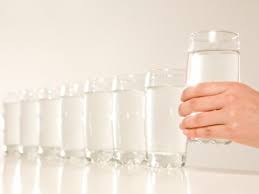Top 20 symptoms that it's time to fill up on H20:
We cannot live without water as up to 60% of the adult human body is made up of water.
Water is the essence of the human body and the functioning of the body depends on it. A lack of water can lead to a plethora of health problems from hair loss to blood pressure. Here are the top 20 signs and symptoms of dehydration.
Dehydration: Symptoms of lack of water in the body
Water is the essence of the human body and the functioning of the body depends on it. A lack of water can lead to a plethora of health problems from hair loss to blood pressure. Here are the top 20 signs and symptoms of dehydration.
Dehydration: Symptoms of lack of water in the body
Muscle cramps/spasms:
Muscle spasms are involuntarily contraction of muscle or groups of muscles. A muscle cramp may last for anything from a few seconds to a few minutes. Lack of calcium, potassium and magnesium and dehydration can stimulate muscle cramps or spasms.
Early ageing:
It is well known that the body is made up of 80% of liquid, when this amount depletes, the skin shrinks. Lack of water increases our chance of getting wrinkles. Drink sufficient water to prevent ageing.
Exhaustion:
When you have a refreshing drink of water, you feel energised. Dehydration results in a lack of energy and leads to fatigue. So it is important to consume water in its natural state or you can opt for naturally flavoured water.
Stomach ulcers:
Lack of food or water can result in a build up of acids in the stomach. So, to protect the stomach lining it is advised to consume food at regular interval of 2 hours and also drink plenty of water.
Constipation:
Hard stools are a sign of constipation. Consume water to soften the stool as this prevents the straining of the rectum, which can lead to piles. Also, consume a high fibre diet.
Digestive problems:
Lack of water or dehydration can increase the acid levels in the stomach causing the lining to erode, it also increases your chances of ulcers and can reduce the levels of digestive juices resulting in digestion related problems.
Dry mouth:
This is one of the symptoms of dehydration. A parched throat is a common when one is thirsty. Lack of fluids depletes the flow of saliva and this gives leads to a dry throat.
Blood pressure - high and low:
Lack of water reduces the blood flow to the arteries and veins and this increases your chances of developing blood pressure.
Obesity:
Studies and research reveals that thirst and hunger can be confused. Hence, you may feel hungry when you are actually thirsty, resulting in overeating. When hungry, drink water or consume fruits as they have high water content.
High cholesterol levels:
Lack of water or dehydration causes an increase in cholesterol levels in the cells. When liquids are depleted from the cells, your body prevents loss of liquids by producing cholesterol, this increases your cholesterol levels.
Dizziness:
Dizziness may be caused due to high or low blood pressure, but lack of liquids in the body can lead to fainting spells, that are common during summer. Lack of water can also cause headaches.
Heart palpitations:
Dehydration can cause heart palpitations. Calm your nerves with water or liquids to prevent heart palpitations.
Respiratory troubles:
Your nasal or respiratory tract should be moist to prevent external elements from entering the respiratory tract and going straight to the lungs. Lack of liquids makes the nasal tract dry and increases our chances of respiratory problems.
Eczema:
Lack of liquids can cause your skin to dry up and turn sensitive. Dry skin gets irritated easily when our body is dehydrated. Sweating is a way to reduce eczema.
Lack of sweating:
Lack of liquids results in lack of sweating. This leads to a build up of toxins in the body, which can increase your chances of developing other health problems.
Nausea:
Lack of liquids can cause nausea but water is also a treatment to stop nausea. When dehydrated, nausea can also be accompanied by headaches, so drink up!
Dry eyes:
Dehydration can also make the eyes dry; sleep, water and right food can reduce the chances of dry eyes.
Lack of urine:
If you consume less water or if you're liquid intake drops, your urine colour changes and the amount of times you urinate drops. Lack of urine also leads to high levels of toxins in the body.
Rheumatism:
Lack of water in the body increases toxins in the body and can also cause joint pains or rheumatism. Lack of liquids to keep the joints lubricated can cause friction resulting in wear and tear.
What is right amount of water intake?
According to research women need two and half litres of water while men need three and half litres of water. Also, check the colour of your urine to determine if you are dehydrated. Dark brown urine reveals your body's lack of liquids and light yellow says you are hydrated.














0 comments:
Post a Comment